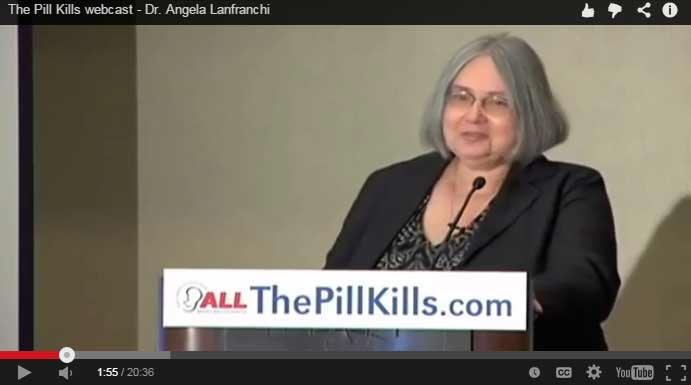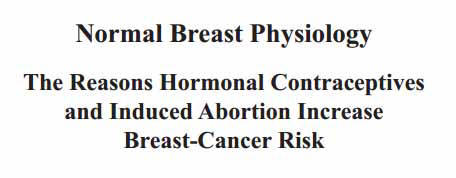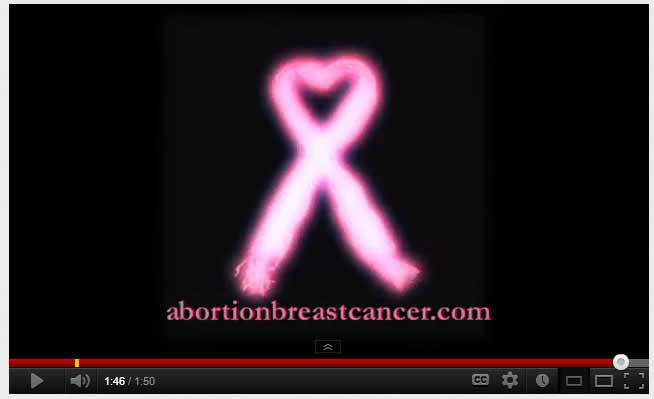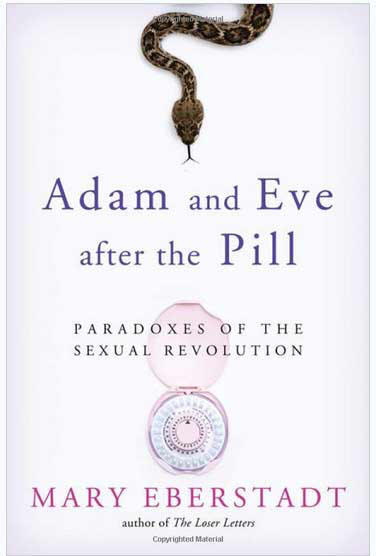An estimated 10.7 million women between 15 and 44 years old used oral contraceptives in 2010.1
Oral contraceptives have a typical use failure rate of 9% per year.2
At that rate, with 10.7 million women using oral contraceptives, 963,000 "unwanted" children were conceived.
There were 765,651 medical and surgical abortions reported to the CDC in 2010.3
With continuous OC use, 1,844 women between 15 and 34 develop breast cancer every five years in the U.S. compared to 638 when not using.1
ORAL CONTRACEPTIVES AND CONCEPTION
Perhaps the most important concern with the use of oral contraceptives, in terms of endangering human life, relates to how often they fail.
With a 9% typical use failure rate2, if 8.5 million women used oral contraceptives to prevent pregnancy in 2010, 765,000 unwanted children would have been conceived.
There were 765,651 medical and surgical abortions reported to the CDC in 2010.3
The second ingredient in the pill, synthetic progesterone derivatives, the same ingredient that is many times stronger (more potent) when found in Plan B, can act as an abortifacient. Consider the following video and publication(s):
ABORTION FACTS AND RISKS

20 Facts Everyone Should Know About Abortion

Abortion Risks: A list of major physical
complications related to
abortion
ORAL CONTRACEPTIVES AND BREAST CANCER

"Since 1975, the incidence of non-invasive
breast cancers has gone up 400%" --Angela Lanfranchi , M.D., FACS
Estrogen-progestin oral contraceptives and combined estrogen-progestin menopausal therapy are carcinogenic to humans. 4
Before age 36, the Relative Risk (RR) for developing breast cancer is 2.1 for four or more years of estrogen-progestin contraceptive use, compared with shorter use.5
Thus, if the normal rate of breast cancer for women between the ages of 20 and 35 is roughly two per 100,000,5 if the same 100,000 women take estrogen-progestin contraceptives for four or more years, four will develop breast cancer. Estrogen-progestin contraceptive use before the age of 20 is associated with a higher relative risk (RR increase of 1.44 per year).
Putting this into
a larger perspective, if the estimated 8.5 million women between the
ages of 15 and 34 that were using oral contraceptives in 2010 had been
using continuously for at least four years, 369 will likely develop
breast cancer every year compared to 128 if none were using, an additional
241 women.
For
the
data sources and calculations
used for these estimates, please
click here.
Similarly, an assessment of twenty-three studies7
evaluating the correlation between breast cancer and the use of oral
contraceptives has yielded an
Odds Ratio of 44% for pre-menopausal women who use oral
contraceptives before their first full-term pregnancy.
According
to the results of this study, if the normal rate of breast cancer for
women younger than 35 who have not had their first full-term pregnancy
is two per 100,000, an additional woman would develop breast
cancer when the same 100,000 women are using oral contraceptives.
The Odds Ratio decreases to 15% after the first full-term pregnancy.
Although estrogen reduces the risk for ovarian and endometrial cancers,
1 in 8 women will develop breast cancer during their lifetime compared
to 1 in 72 for ovarian cancer and 1 in 38 for endometrial cancer.8
For a comparison of survival rates according to stage of cancer, click
one of the following:
breast,
ovarian,
endometrial.
Breast cancer is the most common cancer among women of all ethnicities.9
NATURAL FAMILY PLANNING
NaProTECHNOLOGY
NaProTECHNOLOGY (Natural Procreative Technology) is a new women's health
science that monitors and maintains a woman's reproductive and
gynecological health. It provides medical and surgical treatments that
cooperate completely with the reproductive system.
-
Novuscor
Novuscor is a software company specializing in couples' fertility management and reproductive health. We are devoted to research and application development surrounding fertility cycles and their complexities. Novuscor was established to help people understand and embrace their fertility. Novuscor is proud to introduce FertileView a Biomedical Informatics program for natural fertility management. - Couple to Couple LeagueCouple to Couple League
-
We are an interfaith organization dedicated to teaching Natural
Family Planning (NFP) to married and engaged couples. CCL also has
audio-visual and printed materials on several related subjects:
pre-marital chastity programs for primary and secondary students
(approved by the Catholic Church), ecological breastfeeding, natural
child spacing, full-time mothering, and much more.
- CycleSense
- Fertility tracking software adhering to the teachings of the Roman Catholic Church. It was developed by a team of medical software developers, using FDA approved standards for software development and production, overseen by Jack Geoghegan, MD, former vice-president of Connecticut Right to Life.
- Father McCaffrey's Natural Family Planning Outreach
-
Father McCaffrey travels the United States conducting parish
missions, clergy and catachetical conferences, preaching and
teaching Humanae Vitae. The Church's teaching regarding the
Sacramental nature of marriage and family life as it relates to true
love and responsibility is taught in the full context of the Gospel
of Life.
- My Fertility Charts: Ovulation Calendar
-
Software tools to help couples use Natural Family Planning methods
to achieve or avoid pregnancy.
- Catholic Medical Association
-
Association of North American Catholic physicians, medical students,
health care professionals, and clergy promoting Catholic values in
medicine. Use the CMA website to find a caring Catholic
physician in your area.
- Gift Foundation
-
Non-profit organization dedicated to ending contraception, promoting
chastity, and establishing a pro-life society.
- Life Issues
-
Clear Catholic thinking on current life issues.
- Love and Responsibility Foundation
-
The Love and Responsibility web site is dedicated to increasing
understanding of Pope John Paul II's teaching on human love and
sexuality. The Pope has written with deep beauty on this
all-important topic, and we are motivated by thought that it is
possible to read what he has written, learn from it, and share what
we learn with others!
- Midwest Vasectomy Reversals
-
Our mission to make vasectomy reversal an affordable option for all
families who consider their vasectomy choice a mistake. We charge
$3200 total for a reversal done under local anesthesia in our
outpatient office. Dr. Thomas Sommers had a vasectomy reversal done
under these same conditions and has been blessed with a reversal
baby. We are honored to offer this service to couples to help
restore the gift of fertility and return to God's Grace.
- One More Soul
-
One More Soul is a non-profit organization dedicated to spreading
the truth about the blessings of children and the harms of
contraception. We have distributed, for free or at cost, over 60,000
copies of the powerful audio tape by Dr. Janet E. Smith,
"Contraception, Why Not?" We carry a wide variety of educational
resources, including tapes, videos, books.
1..
2010 Breast Cancer Incidence per Year per Age Group with
Respect to OC Usage -- 5-21-2016, LifeisSacred.net.
2.
http://www.cdc.gov/reproductivehealth/UnintendedPregnancy/PDF/Contraceptive_methods_508.pdf
(Last accessed 9-28-16.)
3
https://www.cdc.gov/mmwr/preview/mmwrhtml/ss6208a1.htm (Accessed
January 15th, 2018)
4. Press Release No. 167, "IARC
Monographs Programme Finds Combined Estrogen-Progestogen Contraceptives
(the "pill") and Menopausal Therapy Are Carcinogenic to Humans," World
Health Organization International Agency for Research on Cancer, July
29, 2005. See
<
http://www.iarc.fr/en/media-centre/pr/2005/pr167.html >.
5. Rookus MA, van Leeuwen FE. Oral contraceptives and risk of breast
cancer in women aged 20-54 years. Netherlands Oral Contraceptives and
Breast Cancer Study Group. Lancet 1994;344:844 – 51.
6.
http://seer.cancer.gov/statfacts/html/breast.htm (Accessed
2/13/15.)
7.
http://www.polycarp.org/statement_mayo_clinic_article.htm
(Accessed September 7th, 2014)
8.
http://seer.cancer.gov/statfacts/ (Accessed September 7th,
2014)
9.
http://www.cdc.gov/cancer/dcpc/data/women.htm
(Accessed September 7th, 2014)








